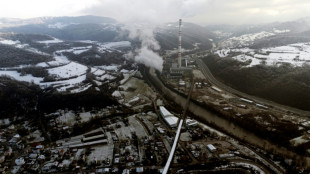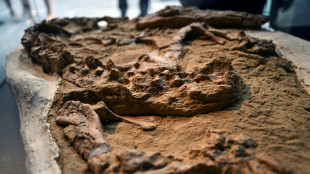
-
 French govt ready for budget concessions to avoid financial 'storm'
French govt ready for budget concessions to avoid financial 'storm'
-
Hong Kong airport third runway takes off

-
 In Bosnia, the path to renewables runs through its coal mines
In Bosnia, the path to renewables runs through its coal mines
-
China probes top military official for corruption

-
 Syria war monitor says more than 130 dead in army-jihadist clashes
Syria war monitor says more than 130 dead in army-jihadist clashes
-
China says top military official Miao Hua under investigation

-
 Taiwan president's plan to stop over in Hawaii, Guam angers Beijing
Taiwan president's plan to stop over in Hawaii, Guam angers Beijing
-
Russian attacks leave one million Ukrainians without power

-
 Markets mixed after subdued pre-holiday shift on Wall St
Markets mixed after subdued pre-holiday shift on Wall St
-
What would an ICC arrest warrant for Myanmar's junta chief mean?

-
 China says top military official Miao Hua suspended, under investigation
China says top military official Miao Hua suspended, under investigation
-
Taiwan's Lai to stop over in Hawaii, Guam during Pacific trip

-
 Namibia extends voting after logistical issues
Namibia extends voting after logistical issues
-
LIV Golf's Herbert in charge at Australian Open, Smith two back

-
 Despair in Sweden as gangs recruit kids as contract killers
Despair in Sweden as gangs recruit kids as contract killers
-
Russia launches massive aerial attack on Ukraine's energy sector

-
 Peru scientists unveil crocodile fossil up to 12 million years old
Peru scientists unveil crocodile fossil up to 12 million years old
-
At plastic treaty talks, no united front for industry

-
 Williamson falls for 93 as England fight back in first Test
Williamson falls for 93 as England fight back in first Test
-
South Korea officials say three dead in heavy snowfall

-
 High-flying Fiorentina face test of Scudetto credentials with Inter visit
High-flying Fiorentina face test of Scudetto credentials with Inter visit
-
Verstappen switches focus to re-boot defence of F1 teams' title

-
 UK filmmaker Richard Curtis makes first foray into animation
UK filmmaker Richard Curtis makes first foray into animation
-
Countrywide air alert in Ukraine due to missile threat

-
 China's military corruption crackdown explained
China's military corruption crackdown explained
-
Primark boss defends practices as budget fashion brand eyes expansion

-
 Williamson eyes ton as New Zealand take control against England
Williamson eyes ton as New Zealand take control against England
-
Norway faces WWF in court over deep sea mining

-
 Trump, Sheinbaum discuss migration in Mexico amid tariff threat
Trump, Sheinbaum discuss migration in Mexico amid tariff threat
-
Asian markets mixed after subdued pre-holiday shift on Wall St

-
 Orban's soft power shines as Hungary hosts Israeli match
Orban's soft power shines as Hungary hosts Israeli match
-
'Retaliate': Trump tariff talk spurs global jitters, preparations

-
 'Anti-woke' Americans hail death of DEI as another domino topples
'Anti-woke' Americans hail death of DEI as another domino topples
-
Trump hails migration talks with Mexico president

-
 Truckers strike accusing Wagner of driver death in Central African Republic
Truckers strike accusing Wagner of driver death in Central African Republic
-
London police say 90 victims identified in new Al-Fayed probe

-
 Air pollution from fires linked to 1.5 million deaths a year
Air pollution from fires linked to 1.5 million deaths a year
-
Latham falls for 47 as New Zealand 104-2 in first England Test

-
 US tells Ukraine to lower conscription age to 18
US tells Ukraine to lower conscription age to 18
-
Judge denies Sean Combs bail: court order

-
 Suarez extends Inter Miami stay with new deal
Suarez extends Inter Miami stay with new deal
-
Perfect Liverpool on top of Champions League, Dortmund also among winners

-
 Liverpool more 'up for it' than beaten Madrid, concedes Bellingham
Liverpool more 'up for it' than beaten Madrid, concedes Bellingham
-
Aston Villa denied late winner against Juventus

-
 Mexico president hails 'excellent' Trump talks after US tariff threat
Mexico president hails 'excellent' Trump talks after US tariff threat
-
Leicester set to appoint Van Nistelrooy - reports

-
 Coffee price heats up on tight Brazil crop fears
Coffee price heats up on tight Brazil crop fears
-
Maeda salvages Celtic draw against Club Brugge

-
 Villa denied late winner against Juventus
Villa denied late winner against Juventus
-
Dortmund beat Zagreb to climb into Champions League top four


'No one heard our cries': Tigray war rape survivors recount their ordeals
Rawa curls up on a chair, pulls her knees tight to her chest and hides her face with a large white veil as if to shield herself from the outside world.
"There were seven men who raped me," she whispers, haltingly recounting a brutal assault shortly after the start of the two-year war in Ethiopia's northernmost region of Tigray.
Rawa, whose name has been changed like those of the other rape survivors interviewed by AFP, had just given birth to twins when the fighting broke out in November 2020.
The conflict -- pitting Ethiopian government forces, backed by regional militias and Eritrean troops, against Tigrayan rebels -- killed around 600,000 people, with the warring sides accused of numerous atrocities against civilians.
Rawa, one of the million people still displaced by the war, comes from Welkait, an area in the hotly disputed western Tigray region near the border with Eritrea.
"I stayed behind because I was a new mother, but everyone else fled and left me behind," the 40-year-old tells AFP at a small health clinic in the Tigrayan town of Shire.
Several people denounced her, claiming her husband was part of the rebellion. She was arrested and beaten while carrying one of her infant twins in her arms.
"The baby is no longer alive," she says through sobs, and she still has no idea about her husband's whereabouts.
"I endured a lot of suffering," she says, describing how she lost consciousness during her savage attack at the hands of seven Eritrean soldiers.
Rawa was left HIV positive after the rape.
"I'm not in very good health and I'm not able to go for medical treatment because I don't have the strength and I don't have money for transport," says Rawa, who is now forced to live on the streets with her remaining children, unable to pay rent.
- 'Systematic' rapes -
The fighting in Tigray finally ended with the signing of a peace accord in Pretoria in November 2022, but many victims are still struggling to rebuild their lives.
Among the many barbaric acts inflicted on civilians during the conflict, rape and sexual violence were "systematic" and used as a weapon of war, according to a study published in 2023 by the scientific journal BMC Women's Health.
Estimates of the number of rapes committed vary widely -- up to as many as 120,000 -- according to data compiled by the researchers, with many reluctant to report the attacks.
The victims reported that most of the perpetrators were Ethiopian or Eritrean soldiers, but also militiamen from the neighbouring Amhara region.
The Tigray war had been raging for a year when Tsega -- another rape survivor who spoke to AFP -- went to a small store near her home in the town of Sheraro to buy flour.
Her family had nothing left to eat.
"I thought the stories about soldiers grabbing and raping women were just rumours," says the 29-year-old.
On the way to the shop, Tsega came across two Eritrean soldiers who followed her.
"The soldiers threatened to bomb (the shop) if I didn't come out," she recalls, anxiously twisting a ring around her finger.
"As soon as I left, they forcefully took me away and raped me."
"I only thought of two things: either kill myself or go underground and fight (with the rebels)."
- 'Held in a warehouse' -
Two years on from the Pretoria deal, teams from Doctors Without Borders (MSF) "are still receiving survivors in need of essential psychological and medical support", says Nimrat Kaur, Shire project coordinator manager for the medical charity.
MSF operates two health centres in Shire and Sheraro in collaboration with the regional authorities, with around 40 new people arriving each month.
The vast majority of rapes were committed against women and girls. But men were also targeted.
Mamay, who was 21 at the time, left his home in Humera in western Tigray when fierce fighting erupted at the start of the conflict.
On the road, he was stopped by Eritrean soldiers, along with about 60 other people, including girls aged around 10.
"They held us in a warehouse, then took us one by one and committed sexual assault on us," says the frail young man.
"There was no one to hear our cries... no one to help us," he says, adding that they endured daily assaults over a period of almost two years.
Mamay was finally released along with other captives after the guns fell silent.
Like more than one million other people across Tigray, however, Mamay has still not been able to return home to Humera.
But he is not giving up.
"As a Tigrayan I will not lose hope. Justice will have its day. I'm very sure we will get freedom and return to our homes."
B.Shevchenko--BTB
